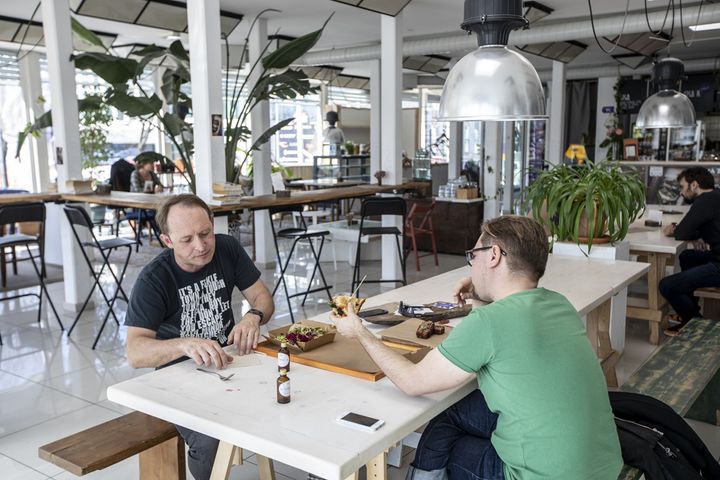 Responsible Hedonism
Responsible HedonismIt might be surprising to learn that Ljubljana, Slovenia, is host to an establishment that claims to be the world's only restaurant serving "proper" food. Welcome to Kucha, home of the so-called "responsible hedonists." Only microbiota-friendly foods are prepared at this restaurant, which specializes in innovative recipes and rich mouth-watering flavors guaranteed to excite one's cravings for healthy fare.
Although Kucha is a vegan restaurant, this is never explicitly stated on its menus. "People want good food, so we try to win them over with our flavors, not through moralizing on how they should live their lives," says Vladimir Mićković, one of the 15 members of the SURF institute, Kucha's governing body.
In Mićković's view, veganism is not so much the answer to our planet's woes as a bandage for a cancerous sore. "You can adopt a vegan diet and still keep harming both your health and the environment," he says.

He believes our daily nutrition is an issue that needs addressing in a much more complex fashion. Kucha's management has done a lot of research into a healthy and responsible diet. "We came to the conclusion that the answer is locally-produced seasonal food – very much like mankind's diet up to the invention of the refrigerator," Mićković explains. This is why they perform traditional methods of food preservation, such as fermenting, which has beneficial effects on microbiota and brings interesting aromas and flavors at the same time.
In truth, Kucha is not the world's only restaurant serving proper food. Its enthusiastic staff, assembled from all walks of life, simply love to make grandiose statements and to approach their mission with a certain playfulness. "Play for the sake of play is an important part of our values, and also the key element in our communication strategy. Our aim is to demonstrate that a person who cares about the planet is not necessarily levitating a few centimeters above the ground, chanting OM and subsisting on prana," Mićković explains with a mischievous grin.
The names of the dishes served at the restaurant are a testament to this spirit of playfulness. Many of them started out as an inside joke rather than strategic deliberation. The seasonal salad bowl, for example, is called 'sisa,' a Serbian word for breasts.The name is a metaphor for the maternal teat furnishing the infant with everything it needs during its first months of life. At Kucha, the staff pride themselves on having come up with an equivalent for adults. One of the versions contains broccoli, beans, red rice, fried carrots, marinated tempeh, young spinach leaves and sour fennel.

All playfulness aside, the management's mission is to address some key issues of our times: the well-being of the planet and people's health. In Mićković's words, "a small band of overly idealistic individuals are driven by aninner imperative to do something for the environment. According to the old economy's logic, growth is both infinite and the only measure of success, which is clearly nonsense." Indeed, on a global scale, we have exceeded four of the nine planetary boundaries laid down by science–extinction rate, deforestation, atmospheric CO2 and the flow of nitrogen and phosphorus – according to a 2015 European Commission report.
The restaurant is also keen to address the pressing issue of food waste. Every two months, they team up with the Food For Life global network for one of their famous Kuchachasti ("On the house") events. The proceedings are used to fund healthy meals for socially vulnerable groups, and the goal is to prepare and distribute 200 such meals each day. In Slovenia alone, some 130,000 tonnes of food are discarded every year, while almost 270,000 of the country's two million inhabitants are living below the poverty threshold, dependent on the kindness of others.
Yet Kucha's ambitions are not confined to Slovenia's borders. With the SURF institute, they are developing their very own protocol for vegetable milk production. The aim is to enable traditional cheese-producing companies to enter the vegetable dairy-substitute market with minimal investment. "The idea is for our products to spread globally, which means we have to seek out sources of locally-grown ingredients," Mićkovićsays.

Once this demanding task is completed, they have already planned their next one, which seems even more ambitious. They intend to design a brand new quality label that covers a food product at every level. This means how responsibly it has been produced, starting from the type of soil it has been grown in, and going all the way to its final act, when it is transformed into waste. The currently existing labels, such as "organic," "vegan" and "fair trade," don't address the whole problem, Mićković says. Recently, he and his colleague Martin Rojnik presented the idea to members of the European Parliament.
Kucha'send goal is multi-faceted: to become a zero waste restaurant with an electric car delivery service, as well as a national hub for food surplus, part of an expanding network with local farmers, and a model for a franchise that can be replicated globally.
This article is being published as part of Earth Beats, an international and collaborative initiative gathering 18 news media outlets from around the world to focus on solutions to waste and pollution.
